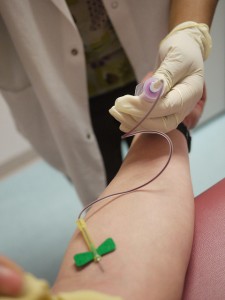Severe vitamin B12 deficiency can take years to develop; if you’ve been diagnosed with borderline pernicious anemia, then there’s still time for you to prevent permanent nerve damage and boost healthy red blood cells…
B12 deficiency is pernicious and sinister
According to the National Health and Nutrition Examination Survey, 3.2% of middle-aged individuals have dangerously low levels of vitamin B12, resulting in symptoms such as constant fatigue, memory loss, depression, and painful numbness and tingling in the extremities.
Additionally, a whopping 20% of people from the same age group have borderline pernicious anemia, meaning that their vitamin B12 levels are steadily plummeting, although none of the characteristic symptoms of vitamin B12 deficiency have manifested themselves…yet.
Untreated, borderline pernicious anemia, or subclinical vitamin B12 deficiency, can quickly escalate into full-blown clinical pernicious anemia, causing more than just a few debilitating symptoms.
Long-term pernicious anemia can lead to irreversible nerve damage, blood diseases, an increased risk for heart attack or stroke, and in worst-case scenarios, death.
Risk factors
Pernicious anemia is not exactly a disease, but rather a condition that can occur as a result of an underlying illness or other risk factors.
Risk factors for pernicious anemia or any other forms of vitamin B12 deficiency include:
- Gastrointestinal disease (Crohn’s disease, gastritis, stomach ulcers)
- Family history for pernicious anemia
- Family history for autoimmune disorders
- Fibromyalgia
- Migraines
- Gastric bypass surgery
- Removal of ilium
- Alcoholism
- Old age
- Strict vegan dieting
For more, read Seven Stages of Vitamin B12 Deficiency
What are the symptoms of borderline pernicious anemia?
Unfortunately, there are rarely any apparent symptoms when vitamin B12 deficiency is still at the subclinical stage.
Sometimes, a blood test can confirm if vitamin B12 levels are noticeably low, but not always. Most vitamin B12 blood screenings test for total vitamin B12 molecules in your entire body, without distinguishing between “active B12” and dormant B12 which sits in your liver.
If you fall into any of the risk factors for even borderline pernicious anemia, then you should supplement with extra vitamin B12, even if you haven’t noticed any of the telltale symptoms, in order to prevent depletion.
Your turn!
Do you have any questions or suggestions? Please leave your comments below.
Enter to win a free iPad!
Through February 10, 2013, enter the B12 Patch iPad 2 Giveaway! Locate the “Vote and Win” tab at the top left-hand corner of our blog page, or submit your entry at the B12 Patch Facebook iPad Giveaway page.
Share with your friends!
If you found this article helpful, then please share with your friends, family, and coworkers by email, Facebook, or Google+.
Like this? Read more:
6 Degrees of Vitamin B12- B12 Deficiency and Autoimmune Disease
Pernicious Anemia and B12 Deficiency- Historically Fatal, Still Formidable
Sources:
Vitamin B12 deficiency can be sneaky, harmful
Natural History and Prevalence of Vitamin B12 Deficiency
Why Vitamin B12 Deficiency should be on your Radar Screen
Image courtesy of Thirteen Of Clubs/flickr



